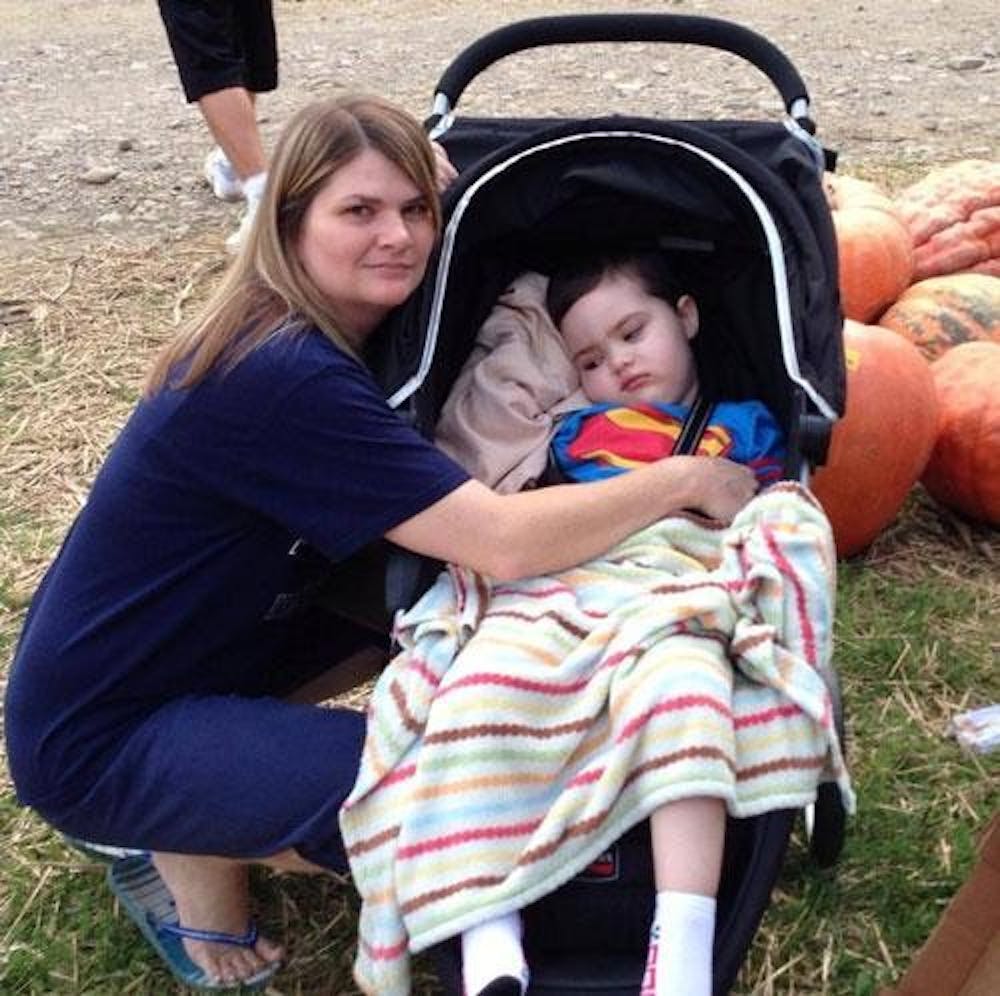
Miami Middletown nursing student Roxanne Ellis holds her grandson, Roy, after an unexpected seizure left him with brain damage. (Contributed by Roxanne Ellis)
Roxanne Ellis has a question. She has a question and nobody seems to have an answer: What happened to her grandson?
Ellis, 41, is a Miami University nursing major and has been taking classes at the Middletown campus since 2010. She has taken this semester off to search for the answer to her question.
Roy "Roro" Ellis III, Ellis' grandchild, was three years old when, one night, his body underwent what doctors could only classify as a "catastrophic event."
On May 1, Roro became violently ill: he vomited, his blood sugar dropped and he began running a fever. This lasted through the night, until his other set of grandparents, with whom he was staying at the time, called 9-1-1.
That night, Ellis, with whom Roro has lived since birth, knew something was wrong.
"When I was getting ready to go to bed, I thought I heard him crying," Ellis said. "I stopped myself and I was like 'He's not here.' I went to bed and I immediately started crying like I knew there was something wrong with him. I knew."
She was right. Roro was taken to Cincinnati Children's Hospital's Intensive Care Unit (ICU) and had a seizure that lasted 48 minutes. Doctors put him in a medically-induced coma for a week to let his brain rest.
Then the tests began.
Doctors did an MRI and found the low blood sugar and seizures had taken their toll. He was diagnosed with encephalopathy, a broad term that means disorder of the brain. But still doctors could not deduce how or why this happened, what caused it or where it would lead.
"We were told that it caused brain damage to his entire brain, not just one area," Ellis said. "They didn't know what he would be like when he woke up, or if he would wake up."
Enjoy what you're reading?
Signup for our newsletter
He did wake up and, in fact, made a lot of improvement.
"Within a week's time, he was able to sit up by himself," Ellis said. "He could actually take steps with therapy, he stood up out of his chair by himself."
However, one night something happened. No one knows what, but his health declined again. This time it was worse.
"He can't sit up by himself, he can't do anything," Ellis said. "He doesn't talk, he doesn't smile."
That is one of the hardest parts, Ellis said. A smile never used to be far away.
"This was the happiest little boy there ever was," Ellis said. "He smiled every day."
And so the tests continued.
Doctors could not figure out what was wrong. They could not answer Ellis' question. They put Roro through 428 tests and just one came back positive: the rhinovirus, or, in other words, the common cold.
Roro now has to spend most of his time in his room, with its walls covered in his favorite Disney movie characters and a television that is always on cartoons. The clutter of toys and games give it the feel of a typical four-year-old's room. Except for the beeping machine beside his bed. Because he still cannot eat solid foods, it feeds Roro Peptamen Jr. through a tube that is connected directly to his stomach.
Ellis is, as she said, Roro's, "24-hour caregiver."
"I do everything for him," Ellis said. "Daily life has changed. I don't have a life; he's my life. But he's worth it."
This has changed everyone's lives, Ellis said. Roro was born when Roy Ellis, Roro's father, was 16. Roy lets his mother, Ellis, do most of the talking, but it is apparent that he is frustrated as well.
"It just gets to me," Roy said.
It only makes circumstances more difficult when Medicaid, a health program that, among other things, gives financial aid to those with disabilities, is reluctant to cover some of the special equipment Roro needs.
"They are not wanting to pay for his wheelchair or his car seat because the diagnosis isn't a good enough diagnosis," Ellis said. "It doesn't make sense."
The tests will continue.
Roro has an appointment with an eye specialist and follow-up appointments with neurologists and physical therapists.
In the meantime, Ellis has hardly had time to think about her future at Miami and what will come after, but when she does, she sees things differently. Ellis got her GED when she was 30 and began working at a nursing home before enrolling at Miami in 2010. She wanted to change career paths, but was not really sure which way to head. She now has a better idea.
"I never thought I would want to work with kids," Ellis said. "But when I do graduate, I probably will work with kids. It is heartbreaking but it also fills your heart with joy when you see them make progress.
Confined to that bed, the one with the Cars sheets, Roro can barely move his arms and makes minimal progress, but through his Facebook group "Hope for Roro," he reaches hundreds. Ellis posts pictures and comments to the page, updating followers on Roro's progress and activity.
Despite all the apparent negativity, 78 days in the hospital and hundreds of tests, Ellis remains hopeful, confident, that doctors will answer her question.
"I'm not living in denial," Ellis said. "I'm living on hope and faith that he will recover. It's all I have."
There will be a benefit for Roro and his family, from open to close Nov. 23 at Eli's Sports Bar in Ross. There will be games, raffles and a performance by country singer Ryan Broshear. All proceeds go to the purchase of Roro's equipment and the funding of a second opinion.




